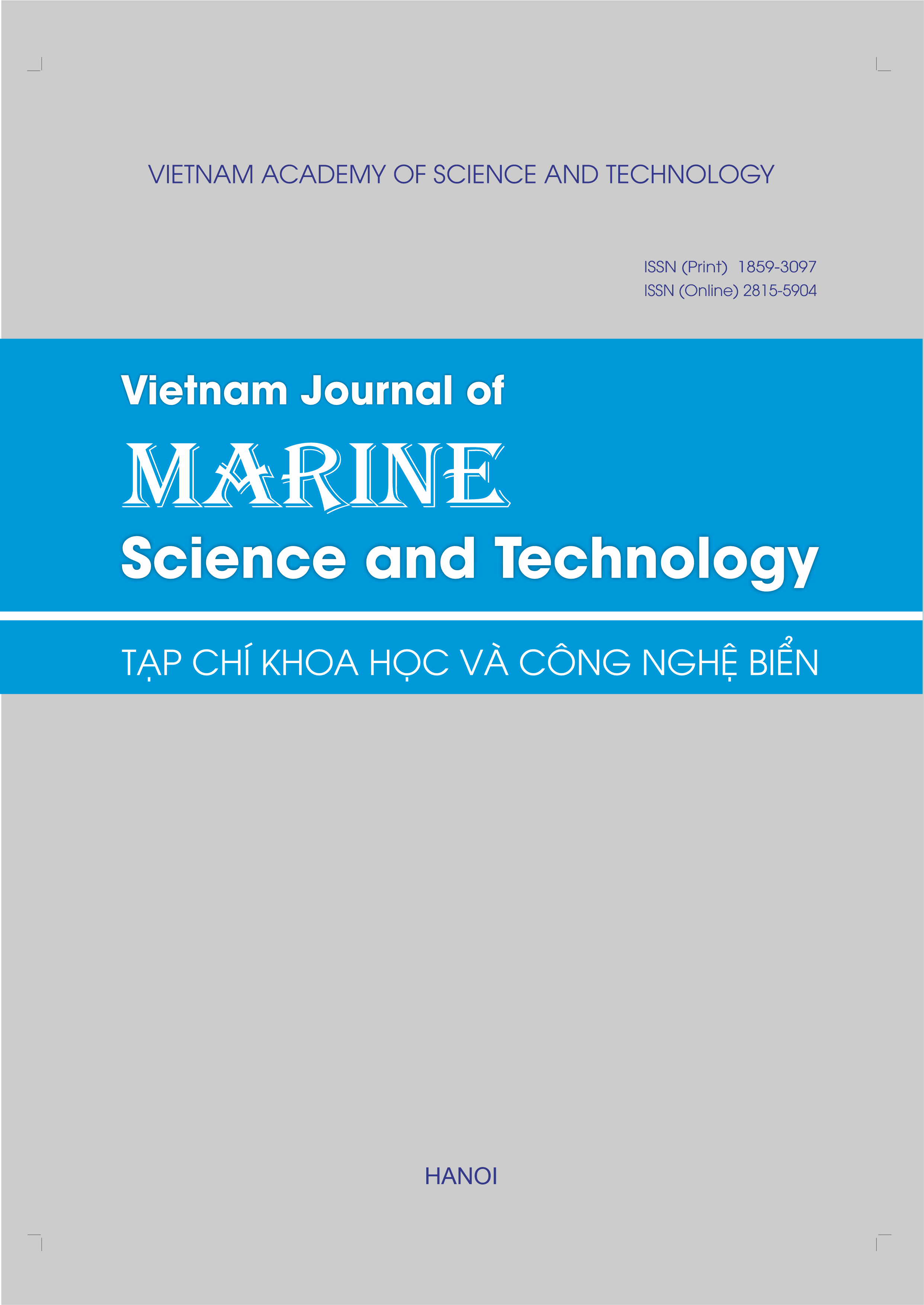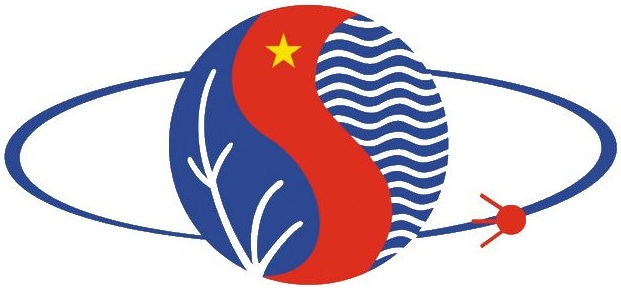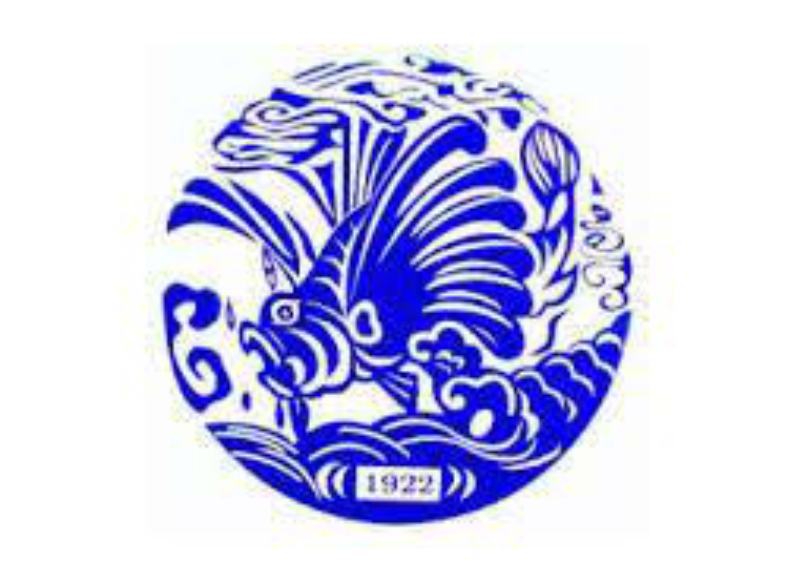Intracellular reactive oxygen species scavenging effect of fucosterol isolated from the brown alga Sargassum crassifolium in Vietnam
Author affiliations
DOI:
https://doi.org/10.15625/1859-3097/20/3/15248Keywords:
Sargassum crassifolium, alga, fucosterol, ROS, antioxidant, Hep-G2 cells.Abstract
Sargassum is a widely distributed marine brown algal genus in Vietnam and has been considered a source of diverse bioactive metabolites. In this study, S. crassifolium collected from South Central region of Vietnam was chemically studied and bioactively evaluated. Fucosterol was isolated and identified from the methanolic extract of the alga by means of chemical fractionation and spectral analysis and showed no cytotoxic effect in Hep-G2 cells at the observed concentrations. In vitro assay for intracellular reactive oxygen species by dichlorofluorescein method revealed a potent scavenging effect of the isolated compound. Accordingly, the level of intracellular reactive oxygen species induced by hydrogen peroxide (H2O2) was reduced by 71.66% with the treatment of fucosterol at 10 µg.ml-1. The results indicated the ability of algal fucosterol in diffusing into cells and preventing the production of different ROS compounds and further suggested the therapeutic potential against diseases caused by oxidative stress of natural metabolites from S. crassifolium in Vietnam.
Downloads
References
Ministry of Natural Resources and Environment, 2018. Vietnam’s Second National Communication to the United Nations Framework Convention on Climate Change. https://unfccc.int/ resource/docs/natc/vnmnc02.pdf (accessed November 1, 2019).
Nagai, K., Kono, S., and Quang, D. X., 1998. Wave characteristics on the central coast of Vietnam in the South China Sea. Coastal Engineering Journal, 40(4), 347–366. https://doi.org/10.1142/S0578563498 000200.
Van Nguyen, T., Le, N. H., Lin, S. M., Steen, F., and De Clerck, O., 2013. Checklist of the marine macroalgae of Vietnam. Botanica Marina, 56(3), 207–227. https://doi.org/10.1515/bot-2013-0010.
Mattio, L., and Payri, C. E., 2011. 190 years of Sargassum taxonomy, facing the advent of DNA phylogenies. The Botanical Review, 77(1), 31–70. DOI 10.1007/s12229-010-9060-x.
Blunt, J. W., Copp, B. R., Hu, W. P., Munro, M. H., Northcote, P. T., and Prinsep, M. R., 2008. Marine natural products. Natural Product Reports, 25(1), 35–94. DOI: 10.1039/B701534H.
Yende, S. R., Harle, U. N., and Chaugule, B. B., 2014. Therapeutic potential and health benefits of Sargassum species. Pharmacognosy Reviews, 8(15), 1–7. DOI: 10.4103/0973-7847.125514.
Narayan, B., Miyashita, K., and Hosakawa, M., 2005. Comparative evaluation of fatty acid composition of different Sargassum (Fucales, Phaeophyta) species harvested from temperate and tropical waters. Journal of Aquatic Food Product Technology, 13(4), 53–70. https://doi.org/10.1300/J030v13n04_05.
Hong, D. D., Hien, H. M., and Son, P. N., 2007. Seaweeds from Vietnam used for functional food, medicine and biofertilizer. Journal of Applied Phycology, 19(6), 817–826. https://doi.org/10.1007/s10811-007-9228-x.
Thinh, P. D., Menshova, R. V., Ermakova, S. P., Anastyuk, S. D., Ly, B. M., and Zvyagintseva, T. N., 2013. Structural characteristics and anticancer activity of fucoidan from the brown alga Sargassum mcclurei. Marine Drugs, 11(5), 1456-1476. https://doi.org/10.3390/md1105 1456.
Cuong, H. D., Thuy, T. T. T., Huong, T. T., Ly, B. M., & Van, T. T. T. (2015). Structure and hypolipidaemic activity of fucoidan extracted from brown seaweed Sargassum henslowianum. Natural Product Research, 29(5), 411–415. https://doi.org/10.1080/14786419.2014.948436.
Cuong, D. X., Boi, V. N., and Van, T. T. T., 2016. Effect of storage time on phlorotannin content and antioxidant activity of six Sargassum species from Nhatrang bay, Vietnam. Journal of applied phycology, 28(1), 567–572. DOI 10.1007/s10811-015-0600-y.
Bilan, M. I., Ustyuzhanina, N. E., Shashkov, A. S., Thanh, T. T. T., Bui, M. L., Van Tran, T. T., and Usov, A. I., 2017. Sulfated polysaccharides of the vietnamese brown alga Sargassum aquifolium (Fucales, Sargassaceae). Carbohydrate Research, 449, 23–31. https://doi.org/10.1016/j.carres.2017.06.016.
Nakai, M., Kageyama, N., Nakahara, K., and Miki, W., 2006. Phlorotannins as radical scavengers from the extract of Sargassum ringgoldianum. Marine Biotechnology, 8(4), 409–414.
Kim, S. H., Choi, D. S., Athukorala, Y., Jeon, Y. J., Senevirathne, M., and Cho, K. R., 2007. Antioxidant activity of sulfated polysaccharides isolated from Sargassum fulvellum. Preventive Nutrition and Food Science, 12(2), 65–73.
Hwang, P. A., Wu, C. H., Gau, S. Y., Chien, S. Y., and Hwang, D. F., 2010. Antioxidant and immune-stimulating activities of hot-water extract from seaweed Sargassum hemiphyllum. Journal of Marine Science and Technology, 18(1), 41–46.
Seo, Y., Park, K. E., and Nam, T. J., 2007. Isolation of a new chromene from the brown alga Sargassum thunbergii. Bulletin-Korean Chemical Society, 28(10), 1831–1833.
Lim, S. N., Cheung, P. C. K., Ooi, V. E. C., and Ang, P. O., 2002. Evaluation of antioxidative activity of extracts from a brown seaweed, Sargassum siliquastrum. Journal of Agricultural and Food Chemistry, 50(13), 3862–3866. https://doi.org/10.1021/jf020096b.
Jung, M., Jang, K. H., Kim, B., Lee, B. H., Choi, B. W., Oh, K. B., and Shin, J., 2008. Meroditerpenoids from the brown alga Sargassum siliquastrum. Journal of Natural Products, 71(10), 1714–1719. https://doi.org/10.1021/np800321y.
Iwashima, M., Mori, J., Ting, X., Matsunaga, T., Hayashi, K., Shinoda, D., Saito, H., Sankawa, U., and Hayashi, T., 2005. Antioxidant and antiviral activities of plastoquinones from the brown alga Sargassum micracanthum, and a new chromene derivative converted from the plastoquinones. Biological and Pharmaceutical Bulletin, 28(2), 374–377. https://doi.org/10.1248/bpb.28.374.
Mori, J., Iwashima, M., Wakasugi, H., Saito, H., Matsunaga, T., Ogasawara, M., Takahashi, S., Suzuki, H., and Hayashi, T., 2005. New plastoquinones isolated from the brown alga, Sargassum micracanthum. Chemical and Pharmaceutical Bulletin, 53(9), 1159–1163. https://doi.org/10.1248/ cpb.53.1159.
Skehan, P., Storeng, R., Scudiero, D., Monks, A., McMahon, J., Vistica, D., Warren, J. T., Bokesch, H., Kenney, S., and Boyd, M. R., 1990. New colorimetric cytotoxicity assay for anticancer-drug screening. JNCI: Journal of the National Cancer Institute, 82(13), 1107–1112. https://doi.org/10.1093/jnci/82.13.1107.
Wang, H., and Joseph, J. A., 1999. Quantifying cellular oxidative stress by dichlorofluorescein assay using microplate reader. Free Radical Biology and Medicine, 27(5–6), 612–616. https://doi.org/10.1016/S0891-5849(99)00 107-0.
Sohn, J. H., Han, K. L., Lee, S. H., and Hwang, J. K., 2005. Protective effects of panduratin A against oxidative damage of tert-butylhydroperoxide in human HepG2 cells. Biological and Pharmaceutical Bulletin, 28(6), 1083–1086. https://doi.org/10.1248/bpb.28.1083.
Goad, L. H., and Akihisa, T., 1997. Analysis of Sterols, London, Blackie Academic & Professional, 168. Google Scholar| Crossref.
Sánchez‐Machado, D. I., López‐Hernández, J., Paseiro‐Losada, P., and López‐Cervantes, J., 2004. An HPLC method for the quantification of sterols in edible seaweeds. Biomedical Chromatography, 18(3), 183–190. https://doi.org/10.1002/bmc.316.
Liu, X., Wang, C. Y., Shao, C. L., Wei, Y. X., Wang, B. G., Sun, L. L., Zheng, C.-J., and Guan, H. S., 2009. Chemical constituents from Sargassum pallidum (Turn.) C. Agardh. Biochemical Systematics and Ecology, 2(37), 127–129. DOI: 10.1016/j.bse.2009.01.009.
Payghami, N., Jamili, S., Rustaiyan, A., Saeidnia, S., Nikan, M., and Gohari, A. R., 2015. Alpha-amylase inhibitory activity and sterol composition of the marine algae, Sargassum glaucescens. Pharmacognosy Research, 7(4), 314–321. Doi: 10.4103/0974-8490.167893.
Zhen, X. H., Quan, Y. C., Jiang, H. Y., Wen, Z. S., Qu, Y. L., and Guan, L. P., 2015. Fucosterol, a sterol extracted from Sargassum fusiforme, shows antidepressant and anticonvulsant effects. European Journal of Pharmacology, 768, 131–138. https://doi.org/10.1016/j.ejphar. 2015.10.041.
Fernando, I. S., Jayawardena, T. U., Kim, H. S., Lee, W. W., Vaas, A. P. J. P., De Silva, H. I. C., Abayaweera, G. S., Nanayakkara, C. M., Abeytunga, D. T. U., Lee, D.-S., and Jeon, Y. J., 2019. Beijing urban particulate matter-induced injury and inflammation in human lung epithelial cells and the protective effects of fucosterol from Sargassum binderi
(Sonder ex J. Agardh). Environmental Research, 172, 150–158. https://doi.org/ 10.1016/j.envres.2019.02.016.
Moni, S. S., Alam, M. F., Makeen, H. A., Alhazmi, H. A., Sultan, M., Siddiqui, R., Jabeen, A., Sanobar, S., Alam, M. S., Rehman, Z. U., Elmobark, M. E., Madkhali, O., Haque, A., and Albratty, M., 2019. Solvent extraction, spectral analysis and antibacterial activity of the bioactive crystals of Sargassum aquifolium (Turner) C. Agardh from Red Sea. Natural Product Research, 1–5. https://doi.org/10.1080/ 14786419.2019.1645659.
Sheu, J. H., Wang, G. H., Sung, P. J., and Duh, C. Y., 1999. New cytotoxic oxygenated fucosterols from the brown alga Turbinaria conoides. Journal of Natural Products, 62(2), 224–227. https://doi.org/10.1021/np980233s.
Lee, S., Lee, Y. S., Jung, S. H., Kang, S. S., and Shin, K. H., 2003. Anti-oxidant activities of fucosterol from the marine algae Pelvetia siliquosa. Archives of Pharmacal Research, 26(9), 719–722. https://doi.org/10.1007/BF02976680.
Lee, Y. S., Shin, K. H., Kim, B. K., and Lee, S., 2004. Anti-Diabetic activities of fucosterol from Pelvetia siliquosa. Archives of Pharmacal Research, 27(11), 1120–1122. https://doi.org/10.1007/BF02975115
Jung, H. A., Jin, S. E., Ahn, B. R., Lee, C. M., and Choi, J. S., 2013. Anti-inflammatory activity of edible brown alga Eisenia bicyclis and its constituents fucosterol and phlorotannins in LPS-stimulated RAW264. 7 macrophages. Food and Chemical Toxicology, 59, 199–206. https://doi.org/10.1016/j.fct.2013.05.061.
Evans, W. C., 2009. Trease and evans’ pharmacognosy E-book. Elsevier Health Sciences.
Downloads
Published
How to Cite
Issue
Section
License
Copyright (c) 2020 Vietnam Journal of Marine Science and Technology

This work is licensed under a Creative Commons Attribution-NonCommercial-NoDerivatives 4.0 International License.








